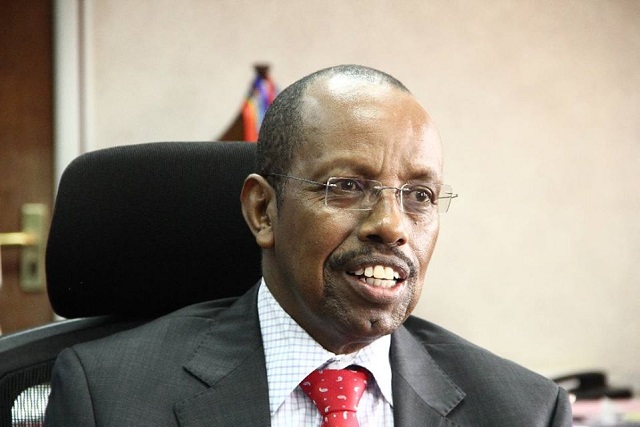
The quintessential public servant and free market intellectual Uganda will miss
THE LAST WORD | Andrew M. Mwenda | Tragedies rarely come in a trickle but in a flood. And so it was that on Wednesday last week, I heard of the death of my former lecturer and friend, John Ntambirweki. Then on Thursday, an even bigger shock, the death of Keith Muhakanizi, former permanent secretary in the office of the prime minister (OPM).
He was, however, most famously known for being the permanent secretary in the ministry of finance and also secretary to the treasury. There at the ministry of finance is where he cut his teeth. It is there that he lived, grew, trained, learned, worked, matured and then ruled, directed, controlled, mentored, governed, held court.
Keith was a titanic character, happy, boisterous, friendly, firm, quick-witted, grounded, charming, intelligent, humble, modest, arrogant, rude, proud, principled, inquisitive, humorous, consistent, sincere, open, careful, forceful.
Anyway, I could use every adjective to describe him because, well, Keith was everything. Keith never sought to be anyone’s version of Keith. He was always his own version of Keith. He did not act to please anyone or make any impression – good or bad.
He acted as he was and as he felt. He thought, talked, walked, laughed, joked, ate, drunk, swam, played, debated, argued, as he wished actually as he was made. He was one of the most genuine, raw and unedited persons I ever met.
To know this man, this icon, this titan, this kind, friendly and generous lion of a man was, for me, a defining moment at both a personal and a professional level.
It is hard as it is painful for me to describe this friend, this passionate lover and critic of my work, this dedicated civil servant, this rigorous intellectual, this numbers man, this loving dad and husband.
Where do I even begin? Because for some strange reason fate, providence, luck, destiny whatever it was Keith and I became friends. We mingled, tangled, rhymed, then dined, debated, gossiped, argued, conspired, worked, shared: him as team leader; me, as rebel disciple.
I met Keith in 1996 when I was a young journalist at Makerere University trying to write articles on economic policy. He immediately told me off: “you fool (which he pronounced as furu and didn’t give a damn what one thought of his accent), don’t write things you don’t know. If you want information come here and get it.”
He walked me to his office, gave me a pile of documents, then proceeded to give me a lecture on how Uganda’s economy was performing among the best in the world. I was hooked. And there began a long and fruitful friendship, collaboration and union.
There is no public official I have related with as much as I did with Keith. I was always at his office. I never made an appointment to see him because I didn’t need to. I only did so to avoid “bouncing.” I would go to his office and greeted his loyal secretaries – Lyton and Sauda, and then walk in.
If he was not busy, he would stand, shake my hand and offer me green tea with honey. If he was in a meeting with people – government officials, development partners etc., he would stand up furiously and shout: “You fool, get out of my office.”
I would also answer: I have just been appointed PS/ST. So, it is you to get out of my office. Then we would laugh. Mzungu guests didn’t quite get this type of humour. Ok, a few did.
Keith and I were always together at the ministry of finance canteen for lunch. And he never forgot to remind anyone who joined us that he paid the bills to which I always answered: “using my money.” During these encounters, Keith and I talked, argued, debated, agreed, disagreed, then agreed to disagree.
He was my most important source of statistics and insights about macroeconomic performance and budget dynamics. He was always keen to demonstrate the conflict between technocratic and political considerations, and then show me why compromise is vital for government functionality. I became his student and disciple. Somehow, somewhere, he made me.
Beyond this personal Keith lay the more important Keith the public servant and free market intellectual. That is the man the country will mourn, miss, celebrate, reminisce, etc. Keith’s death marks the end of an era and a generation. This was an era of Uganda’s liberal economic reforms.
And Keith was a central player among the team that was assembled by deceased former Bank of Uganda governor, Emmanuel Tumusiime-Mutebile. It also included Chris Kasami, Damon Kitabire, Lawrence Kiiza, Florence Kutesa and a few others. It was a team of technocrats that believed, almost biblically, in the efficacy of the free market as a vehicle for development.
They also held the state in deep suspicion. They argued it should only provide an enabling environment and leave the rest to the private sector to do its magic. On this, me and them locked horns constantly.
When President Yoweri Museveni sought to resuscitate Uganda’s economy in 1986, he tried command policies such as price controls, state ownership of production, barter trade, trade licensing, foreign exchange restrictions etc. The economy contracted. He needed foreign exchange to import spare parts to rehabilitate industries, import fuel and even pay for basic state functions such as maintenance of law and order.
However, it was the period towards the end of the Cold War. His natural allies in the Eastern bloc were themselves withdrawing from these statist policies under Soviet leader Mikhail Gorbachev’s Glasnost and Perestroika.
So, Museveni and his government were forced to turn to the West. But western bilateral donors insisted they could only help Uganda if its government reached an agreement with the IMF. At the time, IMF was working in close collaboration with the World Bank and the two were dogmatic.
They had a one-size-fits-all approach to macroeconomic policy. IMF insisted on immediate “stabilization” some shock therapy of rapidly cutting government spending. The aim was to control inflation by bringing government spending in line with its revenues.
The second part of stabilization was to remove price controls and hence government subsidies to health, education, student allowances etc. had to go.
The World Bank’s reform recommendations were known as Structural Adjustment. These were of a long-term nature and included such measures as liberalization of the economy, deregulation of economic activity and privatization of state enterprises.
Museveni accepted these policies largely out of desperation than conviction. It is here that the role of Mutebile, Kasami and Keith with their allies in the IMF and World Bank becomes significant. The technocrats at the ministry of planning (before it merged with finance) were faithful believers in the IMF/World Bank gospel.
Hence, the two Breton Wood institutions did not have to impose conditionalities on Uganda. This group insisted to government, especially to Museveni, that these policies are good for Uganda. With time, supported by their allies at IMF and World Bank, this team led Museveni from being Saul to become the Paul of free market thinking.
Therefore, to understand Keith’s role in Uganda’s reconstruction after 1986 is to first see him as a team-player, and an influential one, on this Mutebile team. He was an enthusiastic disciple of the free-market gospel and equally its articulate and forceful defender. This won him a lot of attention from the donor community.
Thus, when he went to negotiate with “development partners”, he got what he wanted, well, because he shared their thinking. Museveni noticed that Keith always delivered, hence his climb on the ladder of the ministry of finance to the top. This bolstered his inborn self-confidence and thereby gave him considerable power.
Keith ran government in many ways than one. He was excellent at networking so he built friendships and alliances across the board in all ministries and government agencies, in the private sector, in the donor community, in civil society, the mass media, in the churches and mosques and in academia.
With these networks, he influenced many appointments across the entire government including the appointment (and firing) of some of his bosses, the ministers of finance. Many permanent secretaries and heads of government agencies were appointed at Keith’s personal recommendation and lobbying. With time, this brought him some trouble as other players noticing his power began to fight.
Thus, delegations began going to the president to complain about Keith. They accused him of corruption. The president investigated and found nothing. They accused him of arrogance. They accused him, correctly, of wielding too much power. But Museveni is a very loyal leader to his lieutenants.
He kept Keith in place because he trusted him and because Keith always delivered. Keith knew how to handle Museveni and the president knew that Keith meant well. Keith knew how to reconcile the conflicts between bureaucratic principles and political necessity and navigated that terrain with excellence. He thus ensured politicians were always held in check.
Yet Keith also lost many battles. He and his allies in the ministry of finance resisted, with incredible determination, the growth in the size of public administration (political patronage). They argued, insisted, pleaded but failed to stop the growth of this sector which includes parliament, districts, presidential advisors, RDCs, and so many commissions and semi-autonomous government agencies.
Rather than throw up his arms in resignation, or resigning, Keith understood the political economy that dictated what looked to many as government dysfunction. He reconciled himself with what he saw as politically inevitable.
His greatest achievement was the reform of government finances to close off many leakage nodes that became manifest in the OPM scandal led by Kazinda and the pension scandal led by Christopher Obeyi.
Government lost hundreds of billions of shillings to ghost pensioners and as money meant for northern Uganda reconstruction. These scandals rocked the country like a thunderbolt and exposed the holes in the financial management system of the country.
Principle accountants in ministries were gods and could siphon billions from government to themselves. When he became PS/ST, Keith acted with tremendous speed and stubborn resolution. He created a single treasury account.
What does this mean? Previously, every government institution with a vote on the budget got its money from government to its own accounts in commercial banks. It is from these accounts that government agencies paid suppliers. This system was subject to many abuses. They could draw the money in cash to pay whoever they wished, hence opportunities to steal. Second, commercial banks competed for these accounts.
Some therefore would bribe government officials to open accounts with them. Third, many government officials would collude with commercial banks to delay payment of suppliers so that banks could trade with this money for two, three or even six months. The public officials would get a commission off this.
Keith was resolute on closing this leakage node. He centralized all government funds at the Bank of Uganda on a single treasury account. He helped put in place an Integrated Finance Management System (IFMS).
Here, an accounting officer would have to upload an invoice and a contract of a supplier into the system. The accounting officer had a password that allowed him to access funds up to the limit of his/her quarterly release. Then money would be paid directly from this single treasury account to a supplier. This would leave behind a digital record of all the documentations against which payment was made. It became difficult (not impossible) to steal government funds. But it also became easy to catch the thieves.
Keith was an institution builder. After Mutebile and Kasami left, he strengthened the ministry of finance, promoting the best and placing them in the most strategic positions. He also cultivated a strong espirit de corps in his team and got, without demanding, loyalty from them. He was results oriented and did not hesitate to reprimand any official who failed to deliver.
Keith believed in facts and figures. He despised speculations and imaginations in making judgements. So, if you argued with him, he insisted on facts. He always said it is fine to have an opinion, but it should be informed opinion. If you were guessing or speculating, he had not time for you. So, the ministry of finance produced a mountain of data to support their positions. His critics argued that he used data to dazzle rather than to illuminate. To this, Keith asked for an alternative to data. They had none.
Keith, you lived well, worked well, and died a successful intellectual. Even though you have left us at a very young age of 64, your work is worth 100 years. This means your legacy is gigantic. You served our country with dedication and distinction. Many of us will never forget that. Rest well till we meet in the next world. To your wife Janet and the kids, this must be too hard to fathom. I can only say be strong. You have been blessed to have a loving husband and dotting dad. Carry on his legacy.
*****

amwenda@independent.co.ug
 The Independent Uganda: You get the Truth we Pay the Price
The Independent Uganda: You get the Truth we Pay the Price




The grim reaper. Yet looking at all the eulogies of the fallen giant one can’t help noticing the names dropped in relation to the fallen servant of government.
The phrase ‘ moral hazard’ comes to mind when one realizes that Keith’s pedigree got some top military generals and old names like James Kahooza one of the very few old honest officers in the treasury. Being great friends with a respectable journalist like M9 simply means the gullible public got the right message fr the powers that be.And the pun is the state of the Ugandan economy today.
And as you can seein his long illustrious career, you point out his advice to government against uncontrolled expenditure which was ignored anyway.
I always loved it when Dr Fred Muhumuza poked holes in Keith’s skewed analysis but was reminded by a friend that given the same place, Fred would equally fail as he would say ‘don’t you see Ramathan Goobi?’.
RIP
R.I.P.